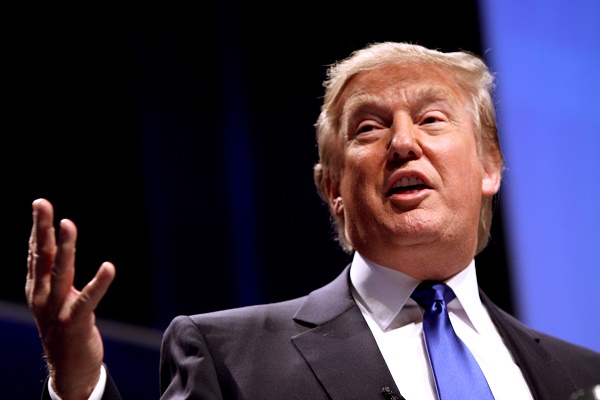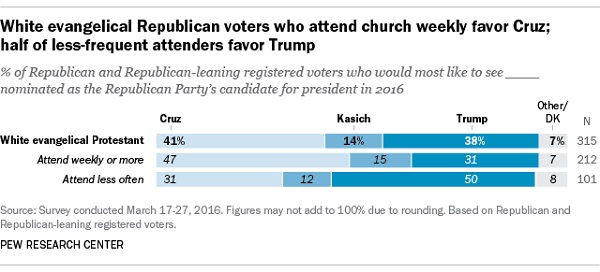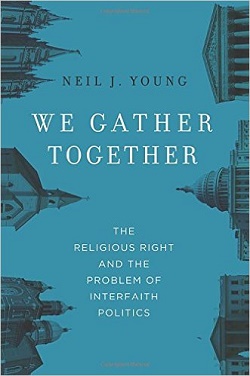
The Puzzle of the Trump Evangelical Vote
- By Kelly Frazier --
- 05 Apr 2016 --

Some are baffled that Evangelicals are voting for thrice-married, formerly pro-choice Donald Trump.
As the race to the Republican and Democratic presidential nominations heats up, the two frontrunners from each side, Hillary Clinton and Donald Trump, fight on to keep their leads and secure the necessary amount of delegates to land the nomination for the presidential election this November.
The Puzzle of the Trump Evangelical Vote[/tweetthis]
In an initially unexpected phenomenon that baffles the minds of many who have kept track of his extreme views on immigration and security, as well as his penchant for uttering inappropriate statements, many question the popularity of Trump both in the polls and primaries, while his support base grows and gets stronger.
Exit polls in the early primaries and caucuses have shown strong support from “self-described evangelical Christians.” There is an overarching perception that evangelicals make up a great portion of this base of followers, which, given his us-first and aggressively hate-mongering rhetoric, seems to be a mystery. He has also been married three times and prior to his political career had identified as “pro-choice.”
Christianity teaches people to love their neighbor and “turn the other cheek,” a principle that directly opposes the Trump way of doing things. As Melania Trump, Donald Trump’s wife, remarked during a Trump event in Milwaukee, “When you attack him (Trump) he will punch back ten times harder.”
Stephen Prothero, professor of religion at Boston University, writing for Politico Magazine, asserts, “The big puzzle in this most puzzling of election seasons if why so many white evangelicals are flocking to Donald Trump, shouting Hosannas as he flies over head in his private jet.” He cites how Trump has won seven states, some of them in the Bible belt, including Massachusetts, Vermont, Tennessee, Georgia, Alabama, Virginia and Mississippi, where he won in the double digits.
A recent Pew survey attempts to shed light on the mystery of the evangelical support of the businessman and real-estate mogul. According to the report, Trump is more highly favored by those who label themselves as evangelical but are actually not regular churchgoers. While 50 percent of those who “attend less often” support Trump, only less than half or 31 percent of those who “attend weekly or more” would vote for him.
Those who do attend church regularly are far more highly concentrated on the side of Ted Cruz. Of the 48% white evangelical Protestants who support Cruz, 35% go to church every week. Six out of ten Cruz supporters attend weekly services while the numbers are much less when it comes to supporters of Trump and John Kasich, the third presidential hopeful in the current GOP race.

Are these numbers indicative of the reality behind the Trump evangelical vote? Or could Prothero be correct in claiming that political observers have simply missed “a profound change in the landscape,” that “America’s evangelicals just aren’t all that evangelical anymore”? Russell Moore, president of the Ethics and Religious Liberty Commission of the Southern Baptist Convention, has stated, “The gospel is more important then politics.” He said further that you cannot be both a Trump supporter and an evangelical at the same time.
Another important issue surrounding the debate is the heavily stereotypical and distorted perception of what it means to be evangelical. According to Julie Lyons of the Houston Press, evangelical voters are not a “monolith;” there is no single face or homogenous demographic to this diverse group of individuals. She observes that in reporting about evangelicals, she has often come upon attitudes of “condescension and religious bigotry.” She defended the group, saying that they are not an “intellectually deficient” lot that furtively plot “ways to institute Old Testament-era theocracy” or “plant bombs at abortion clinics.” She writes emphatically, “we’re not all like your racist grandma.” She also asserts that they are not “single-issue voters” and that have been active in various humanitarian issues for a decade and a half. Evangelicals are simply bible believers who believe that Jesus Christ is their savior and desire to share the gospel to others.
Looking closely at the Pew Report, it is greatly focused on white evangelical Protestants. Lyons’ report shows that the group is actually much more diverse than perceived, with “a much higher proportion of black Americans than whites.” Hispanics also accounted for a higher percentage of evangelicals than whites: about 30 percent. The polled numbers of evangelical voters may not also be as accurate because of clumsy polling procedures, with a lot of voters self-describing as evangelical “as opposed to being a Satanist.”

Neil J. Young, author of We Gather Together: The Religious Right and the Problem of Interfaith Politics and writer for several high-profile publications including the New York Times and Huffington Post, provides another perspective to the Pew statistics. He argues that despite the fact the evangelical support for Trump decreases as churchgoing activity increases, “even among weekly churchgoers, Trump still comes out ahead of this competitors.” He also says that if Trump goes on to gain the vote of one-third of evangelicals who go to church regularly, it would challenge the argument that “suspect[s] the evangelical identity of Trump’s supporters.” He also questions the wobbly measuring stick of church attendance for determining the genuine character of one’s faith, saying that evangelicals have focused their faith on a body of beliefs about salvation and the Word of God, opposing the “ritualistic and works-based” nature of Catholicism.
Kasich, in Huntington, NY, says he can win both Trump and Cruz voters, incl. evangelicals
— Ben Gittleson (@bgittleson) April 4, 2016
Perhaps surveys and analyses can only bring us closer to real answers when it comes to the unexpected nuances of the current electoral process. Numbers cannot lie, but the truth behind these numbers can only be approximated. The best we can do is examine our own principles and that of our presidential hopefuls, and seek to make the wisest decision that will be best for the greater good.




















